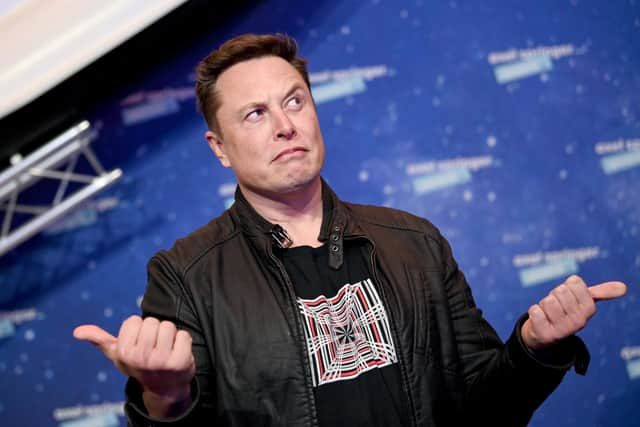Think Elon Musk's Twitter, aka X, is a dead parrot? He might still beat Mark Zuckerberg to Holy Grail of 'everything app' – Gordon Campbell
Like Monty Python’s Norwegian Blue parrot, Twitter’s once-chirpy bird logo has now ceased to be, replaced by Elon Musk’s beloved X. As this digital shake-up unfolds, users are left to ponder if the transformation will resuscitate the platform or leave it “bereft of life” in the wake of Mark Zuckerberg’s Threads launch.
However, a common theme I’ve seen throughout my digital advertising career is the ill-fated rebrand when a new owner gets carried away and wants to put their own stamp on things. I’m not convinced the new name will help the microblogging website soar to new heights. One thing is clear, though – it marks another escalation in Musk’s war with his Meta rival as the tech billionaires battle it out in the apparent arms race towards a super app, or “everything app”.
Advertisement
Hide AdAdvertisement
Hide AdThese Swiss army knife pieces of mobile software offer a range of basic services like chat and payments, alongside “mini-apps” from third parties, ranging from stores to government agencies. While lesser-known in the West, they dominate much of Asia, with China’s WeChat reigning as possibly the most heavily used software globally. On WeChat, you can find a date, hail a cab, pay utilities, and even get divorced.
Musk has made no secret of his ambitions, declaring last year’s controversial purchase of Twitter was an “accelerant” to creating a super app. With the recent rebrand, users have been encouraged to rethink the “whole concept” of what the platform is and what it could become. Chief executive Linda Yaccarino hints at integrating “payments/banking” services, while Twitter begins the regulatory process of becoming a payments processor, potentially offering debit cards and loans under Musk’s leadership.
Zuckerberg's empire is more coy, but it's evident that he also envisions something akin to a super app, having pinned the future of Facebook and the wider company on creating a metaverse for gaming, work, and communication. Other parts of the Meta family, like Instagram and WhatsApp, have successfully integrated payment and e-commerce functions.
Threads might soon follow suit, presenting businesses with opportunities they must remain alert to. Like most of Facebook's successes, Threads could be seen as similar to an existing product. Many people are not yet connecting with the platform and, therefore, sticking with what they know. Its current mobile-only format is another disadvantage, but it can’t yet be written off as a Twitter clone, doomed to fail.
Despite experiencing a slowdown in user engagement after the initial launch frenzy, it's important to note that the app managed to attract a staggering 100 million signups within a week – nearly a third of Twitter's active user base. Threads’ close ties to Instagram, where users are required to have an account to sign up, make it seamless for people to import their entire following list with just one tap, saving them the effort of finding new connections.


With Meta boasting an impressive three billion users across its apps, the increased integration of Threads will become a powerful tool for businesses, influencers, and content creators. Even though Threads is currently not open to ads, it’s likely to become part of the social media behemoth’s cross-platform promotional campaign manager. Analysts predict revenues of around £4 billion a year if enough users become hooked and stay on.
Zuckerberg’s early success in attracting dissatisfied users to Threads is partly due to Musk’s mercurial and controversial reign, introducing a paid subscription model for certain accounts and limiting daily tweet reading. Brands have flocked to Threads amid claims that a moderation shift under the Tesla chief’s ownership created a more hostile and toxic environment, eroding trust in the platform. Ad revenue is down by 50 per cent, while active monthly users are dwindling.
The reverse in public perceptions is an ironic twist for Zuckerberg, who faced his own backlash over disinformation and privacy issues, including the 2018 Cambridge Analytica scandal. Yet, while he aims for Threads to be big and friendly, the question remains: is it possible to have a virtual town square without any heated interactions and at least some level of snark? A plan to avoid politics and hard news may also backfire, as our brains naturally lean toward “doomscrolling” – seeking negative information for increased engagement.
Advertisement
Hide AdAdvertisement
Hide AdMeanwhile, Musk’s drastic cost-cutting and massive debt to acquire Twitter for $44 billion present significant challenges. With its valuation slashed to $15 billion prior to Threads, Musk, despite his wealth, may lack the resources and manpower for the latest transformation. Musk’s well-documented love for the letter X is evident in his early venture X.com, which later merged with PayPal, and his ownership of SpaceX.
However, it’s essential to consider that Twitter users, attached to the familiar bird logo, may not share the same connection. Rebranding can be a double-edged sword, allowing new leaders to make their mark and adapt to changing market trends, but also carrying the risk of alienating loyal customers. Coca-Cola’s 1985 decision to change its recipe serves as a cautionary tale.
Despite positive taste test results for “New Coke”, the public backlash was significant, emphasising the emotional attachment to the original product. However, Musk’s track record of defying expectations can’t be ignored. He proved the naysayers wrong in the automotive industry with Tesla, revolutionising electric cars, and faced ridicule while pursuing his dream of building rockets.
Only time will tell if the ‘X’ can mark the spot for Twitter’s future success, or if it will shuffle off parrot-style into the digital abyss. But Musk’s past achievements remind us that dismissing his ambitions could be a mistake.
Gordon Campbell is co-founder of Glasgow-based digital advertising agency ClickBoost
Comments
Want to join the conversation? Please or to comment on this article.